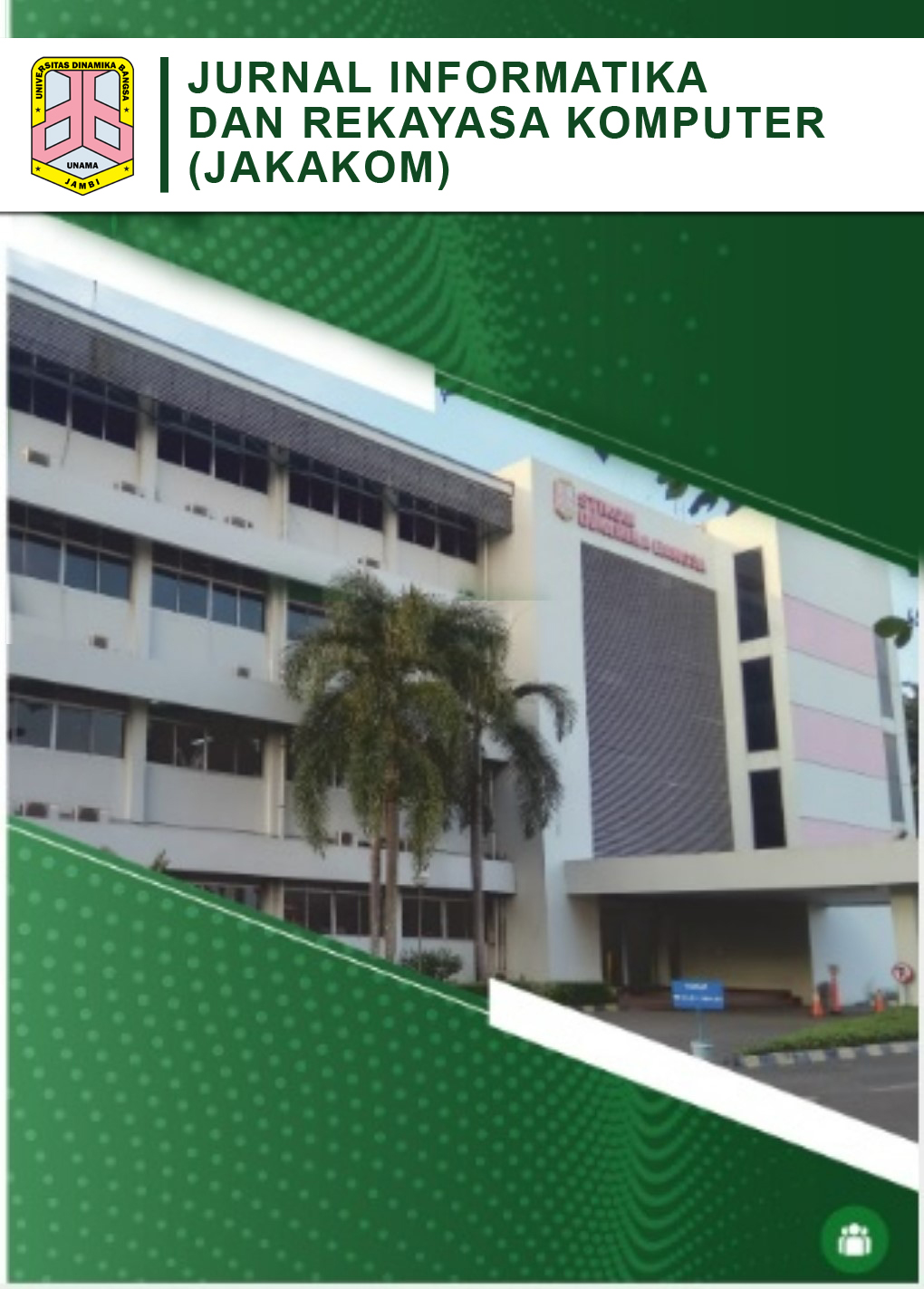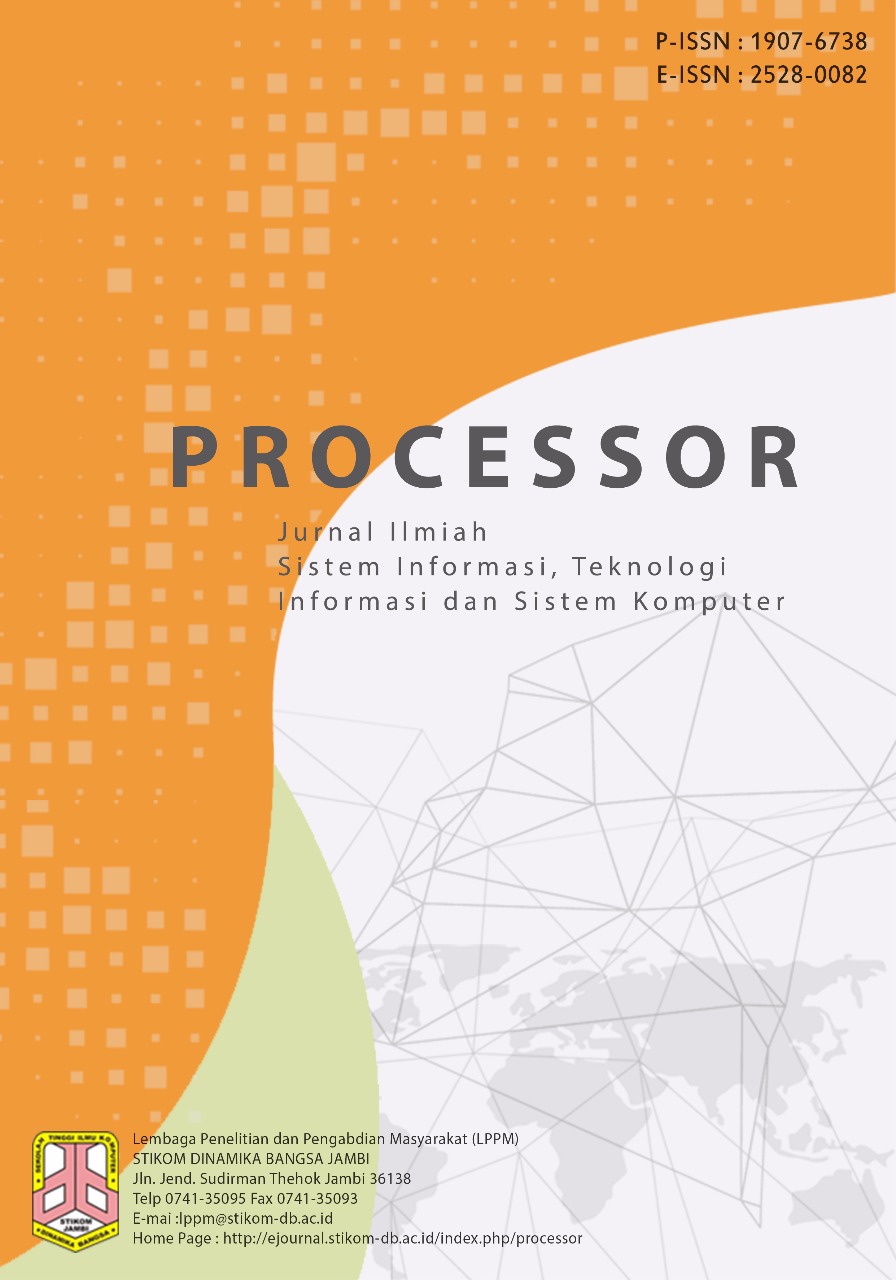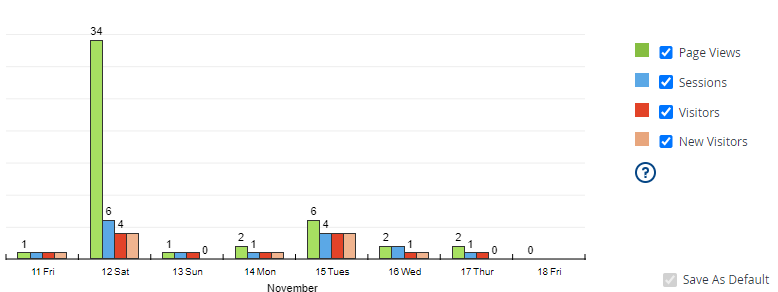Perbandingan Algoritma Naïve Bayes Dan Regresi Logistik Untuk Memprediksi Kesehatan Mental Mahasiswa Di Provinsi Jambi
DOI:
https://doi.org/10.33998/jakakom.2025.5.2.2309Keywords:
Naïve Bayes, Logistic Regression, Prediction, Mental Health, Academic StressAbstract
he mental health of college students is a global concern due to the impact of academic pressure, social issues,
and lifestyle changes. In Indonesia, around 20% of the population is estimated to suffer from mental disorders, with more
than 12 million people experiencing depression. The increase in suicide cases, including among college students in Jambi,
shows the significant impact of stress on mental health. To address this issue, early prediction of mental health disorders is an
important step so that intervention can be carried out earlier. This study compared the accuracy of the Naïve Bayes algorithm
and logistic regression in predicting the mental health of college students in Jambi Province. Data were collected from 300
students at three different universities. The results showed that Naïve Bayes had an accuracy of 99.58% on the training set
and 100% on the testing set, while logistic regression only reached 61.67% on the training set and 63.33% on the testing set.
These results indicate that Naïve Bayes is superior to logistic regression in predicting the mental health of college students.
These findings can be the basis for the development of more effective early detection tools, so that educational institutions
can design appropriate intervention strategies to support student well-being
Downloads
References
U. N. H. Putri and S. M. Nur’aini, Armita Sari, Konsep Kesehatan Mental. Pasaman, Sumatera Barat: CV. Azka Pustaka, 2022. [Online]. Available: dikutip:https://www.google.co.id/books/edition/Modul_Kesehatan_Mental/Yl_Meaaaqbaj?hl=id&gbpv=1&dq=kesehatan+mental&pg=PA8&printsec=frontcover
E. Safittri, K. J. Renada, and K. E. Mawarni, “Analisis Faktor Penyebab Stres Pada Mahasiswa Dan Dampaknya Terhadap Kesehatan,” Pros. Semin. Nas. Manaj., vol. 3, no. 2, pp. 1020–1026, 2024.
World Health Organization, “Mental Health.” World Health Organization [Online], 2022. [Online]. Available: https://www.who.int/health-topics/mental-health#tab=tab_1
Bella Salsa Risnawati, Nasichah Nasichah, Muhammad Faqih Prayogo, and Zannuby Al Izzami, “Faktor-faktor yang Mempengaruhi Kesehatan Mental Mahasiswa Bimbingan dan Penyuluhan Islam UIN Syarif Hidayatullah Jakarta,” J. Ilm. Dan Karya Mhs., vol. 2, no. 1, pp. 179–186, 2023, doi: 10.54066/jikma.v2i1.1389.
A. Sultan, “Diduga Depresi, Mahasiswa UNJA Ditemukan Tewas Gantung Diri di Kamar Kos Muarojambi,” iNews Bekasi, 2023. [Online]. Available: https://bekasi.inews.id/read/263273/diduga-depresi-mahasiswa-unja-ditemukan-tewas-gantung-diri-di-kamar-kos-muarojambi?form=MG0AV3
R. Diansyah, “Mahasiswa Semester Akhir di Jambi Setelah Menjatuhkan Diri Dari Lantai 12 Bank 9 Jambi,” Tim Serumpun Jambi. [Online]. Available: dikutip: https://serumpunjambi.pikiran-rakyat.com/peristiwa/pr-4008329577/mahasiswi-semester-akhir-di-jambi-tewas-setelah-menjatuhkan-diri-dari-lantai-12-gedung-mahligai-bank-9-jambi?page=all&form=MG0AV3
Rinjani Meisa Hayashi, “Survei Populix: Setengah penduduk Indonesia Punya Masalah Kesehatan Mental,” KumparanNEWS. 2022. [Online]. Available: https://kumparan.com/kumparannews/survei-populix-setengah-penduduk-indonesia-punya-masalah-kesehatan-mental-1z1SDRqCUZQ
M. Taufik Hidayat, N. Suarna, and N. Rahaningsih, “Implementasi Algoritma Naïve Bayes Untuk Prediksi Persediaan Barang Pt. Dilmoni Citra Mebel Indonesia,” JATI (Jurnal Mhs. Tek. Inform., vol. 7, no. 1, pp. 693–699, 2023, doi: 10.36040/jati.v7i1.6310.
N. L. W. S. R. Ginantra et al., Data Mining dan Penerapan Algoritma. 2021.
F. Sabry, Naive Bayes Classifier. One Billion Knowledgeable, 2022. [Online]. Available: https://www.google.co.id/books/edition/Naive_Bayes_Classifier/DPTGEAAAQBAJ?Hl=Id&gbpv=1&dq=naive+bayes&pg=PT7&printsec=frontcover
M. Idhom and A. S. Amal, “Penerapan Algoritma Naïve Bayes Untuk Klasifikasi Depresi,” Seminar Keinsinyuran Program Studi Program Profesi Insinyur, vol. 3, no. 1. 2023. doi: 10.22219/skpsppi.v3i1.7713.
A. Salsabila Juwita, A. Rizky Kurniawan, A. Aryaputra Ashari, D. Tyan Putro, V. Nurcahyawati, and H. Artikel, “Implementasi Data Mining untuk Memprediksi Kesehatan Mental Mahasiswa menggunakan Algoritma Naïve Bayes,” KOMPUTEK J. Tek. Univ. Muhammadiyah Ponorogo, vol. 8, no. No 1, p. Hal 61-70, 2024, [Online]. Available: http://studentjournal.umpo.ac.id/index.php/komputek
R. I. Fitria, R. P. Tulodo, N. T. Ujianto, and A. Sofian, “Perbandingan Algoritma Naive Dan Bayes Logistic Regression Untuk Penerimaan Siswa Baru ( Studi Kasus Calon Siswa SMA Negri 1 Brebes ),” vol. 15, no. 1, pp. 32–43, 2024.
J. T. Santoso, Aplikasi AI Dab Machine Learning Dalam Bisnis. 2023.
Karina, R. Efendi, L. Chairani, and I. M. Sari, “Implementasi Regresi Logistik Ordinal Pada Sistem Pembelajaran Daring Di Era COVID-19 Terhadap Kesehatan Mental Guru SD di Kota Pekanbaru,” J. Sains Mat. dan Stat., vol. 7, no. 1, p. 65, 2021, doi: 10.24014/jsms.v7i1.11786.
Y. Indriyani, “Model of Binary Logistic Regression to Predict Mental Health in College Students,” J. Educ. Innov. Public Heal., vol. 2, no. 1, pp. 270–281, 2024, [Online]. Available: https://doi.org/10.55606/innovation.v2i1.2146
M. F. Rifai, H. Jatnika, and B. Valentino, “Penerapan Algoritma Naïve Bayes Pada Sistem Prediksi Tingkat Kelulusan Peserta Sertifikasi Microsoft Office Specialist (MOS),” Petir J. Pengkaj. dan Penerapan Tek. Inform., vol. 12, no. 2, pp. 131–144, 2019, doi: 10.33322/petir.v12i2.471.

















